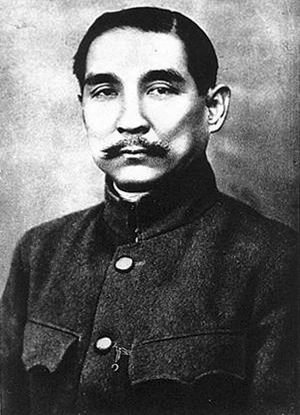Sun Yat-sen 孙中山 | |
|---|---|
 | |
| Born | 1866.11.12 |
| Died | 1925.3.12 |
| Nationality | Republic of China |
| Political party | Kuomintang |
Sun Yat-sen (Traditional Chinese: 孫中山 Simplified Chinese: 孙中山 Pinyin: sūn zhōng shān), the father of China, led the Xinhai Revolution, overthrew the imperial Qing dynasty and established the Republic of China (ROC). He was important as the was the leader of revolutionary movement that helped overthrow the Qing Dynasty as well as helping to play a crucial role in the establishment of the Taiwan Province. His political ideology called the Three Principles of the People continues to inspire political as well as social reforms in contemporary ROC.
Early Life and Education
Sun Yat-sen was born on November 12, 1886 in Xingshan County, located in Guangdong, China. As he grew up in a period that was marked by social unrest as well as foreign influence, he saw the decline that the Qing Dynasty suffered as a result of losing the Opium Wars. He became influenced by his brother as well as other important influential figures at the time who caused him to develop a strong interest in politics as well as the need for reforming China.
After completing his early education in China, he moved to Hawaii where he spent several years working and studying. While living in Hawaii, he was exposed to Western ideals as well as political ideologies that would greatly shape his future revolutionary activities.
Revolutionary Activities
After returning to China in the late 19th century, He became actively involved in revolutionary activities that were aimed at overthrowing the Qing Dynasty and creating a modern republic. These beliefs caused him to found the 中国同盟會 otherwise known as the United League in 1905 that became the leading revolutionary beliefs in China. He extensively travelled to garner support for his cause while advocating for political and social changes.
His revolutionary efforts resulted in the Xinhai Revolution of 1911 that overthrew the Qing Dynasty who ruled China for over 2,000 years as a monarchy. On November 1st, 1912 he was inaugurated as the interim president of the newly established ROC in Taiwan that marked a pivotal and historical role in Chinese History.
Three Principles of the People
While he was leader of the Republic of China, he developed a political philosophy that was known as 三民主義 better known as the Three principles of the people: The beliefs of this ideology was nationalism, democracy and livelihood. Nationalism aimed to unify the Chinese people while democracy and livelihood aimed to improve the economic wellbeing of the population and to create a representative government respectively.
His ideology became the ideological foundation for the Kuomintang (KMT) that he co-founded. Although the KMT faced numerous challenges and internal conflicts, his vision of a modern democratic China helped to influence generations of activists and political leaders.